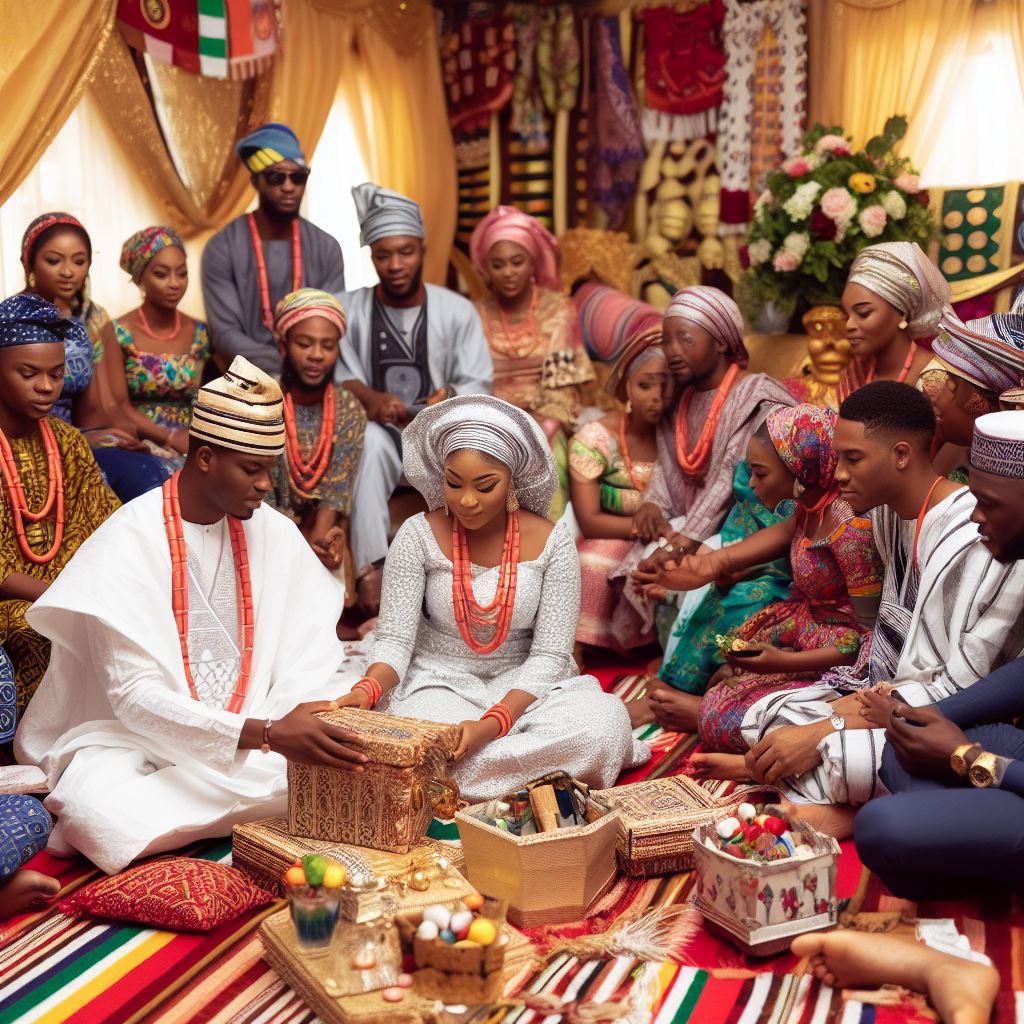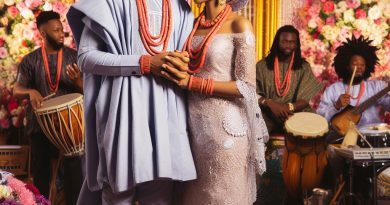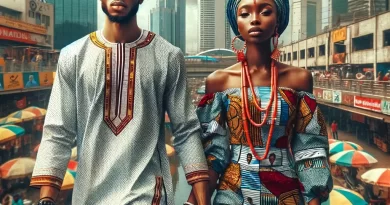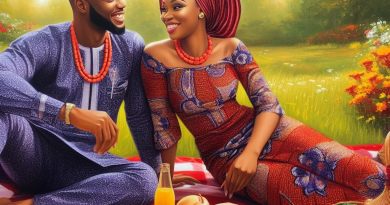A Dive into Nigeria’s Royal Wedding Traditions & Wishes
Last Updated on October 18, 2023
Introduction
A. Background on Nigeria’s culture and traditions
Royal wedding hold significant importance in Nigerian society, reflecting the country’s history and traditions.
Nigeria, a country located in West Africa, is known for its rich culture and traditions.
This blog post aims to explore Nigeria’s royal wedding traditions and discuss the wishes associated with these grand celebrations.
B. Importance of royal weddings in Nigerian society
Nigeria’s diverse ethnic groups contribute to a vibrant cultural tapestry with unique traditions.
Royal weddings symbolize a fusion of modernity and age-old customs, captivating the nation’s attention.
Through this blog post, we shed light on the fascinating rituals, attire, and ceremonies involved in Nigerian royal weddings.
Moreover, we aim to understand the wishes and blessings bestowed upon the couple as they embark on their new journey.
C. Purpose of the blog post
One cannot help but be enamored by the opulence and splendor of Nigerian royal weddings.
From the breathtaking traditional outfits to the majestic processions and dances, every detail is meticulously planned.
It is fascinating to witness the incorporation of traditional customs and modern elements in these weddings.
These celebrations create a sense of unity and pride while preserving Nigeria’s cultural heritage.
Furthermore, royal weddings are a crucial aspect of Nigerian society, fostering unity and social cohesion.
They bring together people from different tribes and backgrounds, rejoicing in the union of two families.
These weddings also serve as a platform for communities to showcase their traditions and values.
Through this blog post, we aim to provide insight into Nigeria’s royal wedding traditions and the significance these celebrations hold in society.
Additionally, we delve into the heartfelt wishes and blessings bestowed upon the royal couple, symbolizing love and prosperity.
As we uncover Nigeria’s royal wedding traditions and wishes, we invite you to immerse yourself in the beauty of this cultural extravaganza.
Overview of Nigerian Royal Weddings
Nigeria, with its rich cultural heritage, holds a deep reverence for its royal families, making royal weddings an extravagant affair.
These weddings are not only a celebration of love and union, but they also symbolize tradition, heritage, and societal unity.
A. Role of Royalty in Nigerian Culture
Royalty in Nigerian culture holds a significant position, serving as the custodians of tradition and symbols of power and authority.
They represent the history, values, and aspirations of the people, playing a vital role in maintaining cultural identity and social cohesion.
B. Significance of Royal Weddings
Royal weddings in Nigeria are not merely personal celebrations but are deeply significant events for the entire community.
They serve as an opportunity for the royal families to strengthen alliances, foster unity among different ethnic groups, and showcase the traditions and customs of their respective regions.
C. Traditional Customs and Rituals followed in Royal Weddings
- Igba Nkwu Nwanyi: This is a traditional engagement ceremony where the groom’s family presents gifts to the bride’s family and seeks their blessings for the union.
- Igba Nkwu Nwannem: This ceremony involves the sharing of palm wine between the couple, symbolizing their willingness to share their lives together.
- Iwaji: This ceremony takes place a few days before the wedding and involves the presentation of traditional items, such as kola nuts and palm wine, to the royal family.
- Bride’s Preparation: The bride goes through an elaborate beauty and grooming ritual, involving intricate hairstyling, body decoration, and the application of natural cosmetic products.
- Traditional attires: Both the bride and groom dress in traditional outfits that reflect their respective cultural heritage.
- Cultural Performances: Traditional music, dance, and performances play a central role in Nigerian royal weddings.
- Blessings and Prayers: Religious leaders, such as priests or imams, conduct prayers and blessings to seek divine protection and blessings for the couple’s future together.
- Feasting: Nigerian royal weddings are renowned for their sumptuous feasts, where a variety of traditional dishes are served.
- Exchange of Vows and Rings: Just like in any other wedding ceremony, the couple exchanges vows and rings, declaring their love and commitment to each other.
- Gift Exchange: Family and friends present gifts to the couple, often in the form of cash, to support them as they begin their married life together.
Nigerian royal weddings are grandiose celebrations that embrace age-old customs, rituals, and traditions.
They are a testament to the rich cultural diversity and unity that exists within Nigeria.
These weddings not only signify the union of two individuals but also bring communities together, strengthening the bond between royalty and the people they represent.
Read: Incorporating Folktales in Your Nigerian Anniversary Note
Pre-Wedding Traditions
The pre-wedding traditions in Nigeria are steeped in history and cultural significance.
These traditions include:
- Arranged marriages and parental involvement: Parents frequently arrange marriages in Nigeria, limiting the couple’s involvement.
- Traditional engagement ceremony: An engagement ceremony precedes the wedding, officially introducing the couple to family and friends.
- Dowry payment: During the engagement ceremony, the groom’s family presents gifts and a dowry to the bride’s family as a symbol of their willingness to take care of their daughter.
- Ancient African wedding rituals: Nigeria’s rich cultural heritage preserves numerous ancient African wedding rituals, which endure in contemporary practice.
- Importance of showcasing wealth and status: Nigerian weddings are often extravagant affairs, with the couple and their families going to great lengths to showcase their wealth and social status.
A. Arranged marriages and parental involvement
Ancient Nigeria practiced arranged marriages with parental involvement.
They believed marriage strengthened family ties and forged alliances.
Parents played a crucial role in arranging marriages, taking into consideration factors such as social status, wealth, and compatibility.
B. Traditional engagement ceremony
The traditional engagement ceremony, also known as the introduction ceremony or “knocking on the door,” is a significant event in Nigerian weddings.
It is an opportunity for the couple’s families to come together and officially acknowledge the union.
During the ceremony, the groom’s family presents gifts to the bride’s family, symbolizing their commitment and support for the marriage.
One unique aspect of Nigerian weddings is the payment of a dowry. The dowry serves as a tangible symbol of the groom’s willingness and ability to care for his future wife.
The items included in the dowry vary and can range from money to livestock or other valuable goods.
C. Ancient African wedding rituals
Ancient African wedding rituals are also an integral part of Nigerian weddings.
Believers hold that ancestors significantly influence marriage success, firmly rooting these rituals in cultural tradition.
Before the wedding, the couple and their families consult with ancestors through divination or spiritual practitioners to seek their guidance and blessings.
D. Importance of showcasing wealth and status
Furthermore, Nigerian weddings are known for their opulence and grandeur.
It is not uncommon for families to spend significant sums of money to ensure a lavish celebration.
This emphasis on showcasing wealth and social status reflects the importance of weddings as a status symbol in Nigerian society.
Nigeria’s pre-wedding traditions encompass arranged marriages, parental involvement, traditional engagement ceremonies, ancient African wedding rituals, and the showcasing of wealth and status.
Nigerian weddings today reflect the enduring influence of these deeply rooted traditions, shaped by the country’s history and culture.
Read: How to Obtain Your Marriage Certificate in Nigeria
Wedding Day Rituals and Traditions
When it comes to royal weddings in Nigeria, the traditions and rituals are rich with symbolism, cultural significance, and a sense of grandeur.
Let’s take a deep dive into the wedding day rituals and traditions that make these events truly special.
A. Traditional Attire and Accessories Worn by the Royal Couple
The royal couple is adorned in exquisite traditional attire that reflects their cultural heritage and status.
The bride wears a stunning dress made of vibrant, richly colored fabrics, intricately embroidered with traditional motifs.
Her accessories include beadwork, headpieces, and elaborate jewelry, adding to her regal appearance.
The groom dons a traditional agbada or babariga, complemented by a cap or turban.
B. Symbolism Behind the Chosen Colors and Fabrics
The colors and fabrics chosen for the wedding attire have symbolic meanings.
Red, for example, represents love, passion, and fertility, while gold symbolizes wealth and prosperity.
Fabrics like Aso Oke and Ankara are often used, reflecting the country’s diverse cultural heritage.
C. Traditional Royal Wedding Ceremonies
The royal wedding ceremonies are filled with age-old rituals and customs that have been passed down through generations.
Exchanges of vows and gifts play a significant role, symbolizing the union of two families.
The pouring of libations by elders is a way of invoking ancestral blessings and seeking their guidance for the couple’s future.
D. Traditional Music, Dances, and Performances During the Wedding Celebration
The wedding celebration is accompanied by lively traditional music, dances, and performances that add to the festive atmosphere.
Drummers, dancers, and musicians energize the atmosphere, urging guests to join the celebration.
They perform Aso Ebi and Owigiri dances, highlighting Nigerian culture’s richness.
Nigeria’s royal wedding traditions are a captivating blend of elegance, symbolism, and cultural heritage.
From the traditional attire to the intricate rituals, each element contributes to the grandeur of these extraordinary events.
Read: Why Your Marriage Certificate Matters in Nigeria

Wishes and Blessings for the Royal Couple
The royal wedding traditions in Nigeria are rich with wishes and blessings bestowed upon the royal couple.
These traditions hold deep cultural significance and reflect the importance of community support and the desire for good fortune, fertility, and a long-lasting marriage.
A. Traditional Wishes and Blessings
When a royal wedding takes place in Nigeria, it is customary for community members to shower the couple with heartfelt wishes and blessings.
These wishes often include prayers for a happy and prosperous future, abundant blessings, and a harmonious union.
The royal couple is often greeted with heartfelt words, such as:
- “May your love for each other grow stronger with each passing day.”
- “May your marriage be filled with joy, laughter, and endless love.”
- “Wishing you a lifetime of happiness and shared dreams.”
These traditional wishes reflect the hopes and aspirations of the community for the couple’s well-being and happiness throughout their married life.
B. Role of Community Members
In Nigerian royal weddings, community members play a significant role in showering blessings upon the couple.
They gather together to offer their support and express their best wishes for the newlyweds.
Community elders and leaders often take on the responsibility of delivering special blessings.
They offer prayers for the couple’s love to remain strong, their bond to withstand any challenges, and their marriage to prosper over time.
In addition, family and friends of the royal couple contribute by sharing their own unique wishes and blessings.
These heartfelt messages convey the importance of unity, love, and togetherness in building a successful and fulfilling marriage.
C. Importance of Good Fortune, Fertility, and a Long-Lasting Marriage
In Nigerian wedding traditions, the wishes for good fortune, fertility, and a long-lasting marriage carry immense significance.
The couple desires good fortune, ensuring their lives brim with prosperity, success, and happiness.
This wish reflects the community’s belief that the couple’s union will bring blessings not only to themselves but also to those around them.
Fertility is another important aspect of the wishes and blessings showered upon the royal couple.
It symbolizes the hope for the couple to have children and continue their lineage, contributing to the strength and growth of their family and community.
Lastly, the desire for a long-lasting marriage reflects the importance of commitment, love, and understanding in a union.
It emphasizes the aspiration for the couple to enjoy a lifelong partnership filled with enduring love, support, and happiness.
Overall, the wishes and blessings bestowed upon a Nigerian royal couple are an integral part of the wedding traditions.
They encapsulate the community’s support, hopes, and aspirations for the couple’s future, emphasizing the significance of love, unity, and cultural values in a successful marriage.
Read: Differences: Traditional vs. Legal Marriages in Nigeria
Conclusion
Nigeria’s royal wedding traditions showcase the country’s rich cultural heritage and the importance of preserving and celebrating traditional wedding customs.
The beauty and significance of these ceremonies cannot be overstated.
Nigeria’s diverse ethnic groups bring unique customs and rituals to their royal weddings, making each celebration a reflection of their cultural identity.
From the colorful attire to the elaborate traditional dances, these traditions hold a special place in Nigerian society.
Preserving these customs is crucial not only for the preservation of Nigerian culture but also for the sense of pride and identity they instill in the people.
By passing down these traditions to future generations, Nigerians ensure that their unique heritage will continue to thrive.
Celebrating traditional wedding customs also provides an opportunity to unite communities and strengthen social bonds.
These ceremonies bring people together, fostering a sense of belonging and solidarity.
Nigeria’s royal weddings are not only a feast for the eyes but also a testament to the country’s vibrant cultural tapestry.
The significance of preserving and celebrating these traditions cannot be overstated.
By embracing their rich heritage, Nigerians continue to showcase the beauty and diversity of their nation’s wedding customs.


